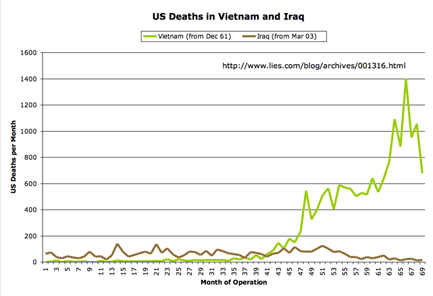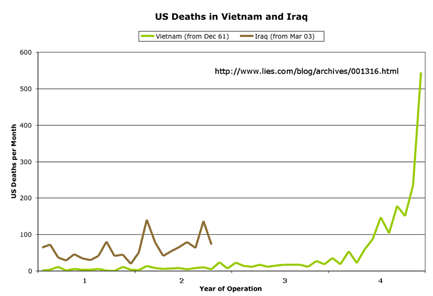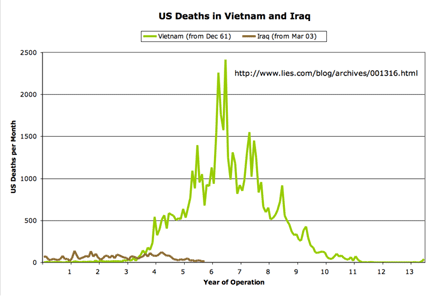US Deaths for July, 2005
US military deaths in Iraq fell in July, with 54 deaths (compared to the 78 deaths in June).
Again, I’m getting these figures from the advanced search tool at the Vietnam Veterans Memorial Fund site, and from Lunaville’s page on Iraq coalition casualties. The figures are for the number of US dead per month, without regard to whether the deaths were combat-related.
The first graph shows the first 29 months of each war. (Click on any image for a larger version.)
Next, the same chart, with the Vietnam numbers extended out to cover the first four years of the war:
Finally, the chart that gives the US death toll for the entire Vietnam war:
Disclaimer: I’m aware that we have more troops in-theater in Iraq than we had during the corresponding parts of the Vietnam War graph. Vietnam didn’t get numbers of US troops comparable to the number currently in Iraq until shortly after Johnson won the 1964 election, some three-and-a-half years after the starting point of the Vietnam graphs above.
These graphs are not intended to show the relative lethality of the two conflicts on a per-soldier basis. I was just curious how the “death profile” of the two wars compared, and these graphs let me see that. You are free to draw your own conclusions.




August 9th, 2005 at 1:42 pm
I am very much against the Iraq war, but I find your graph to be intentionally misleading. The first three years of the Vietnam War, we were there merely as advisors. In Iraq, we started off with a full-scale invasion. The comparison doesn’t work. Yes I read your disclaimer and it doesn’t make the graph any better.
August 9th, 2005 at 2:48 pm
I’m curious what it is that leads you to say I’m being intentionally misleading. In what way have you been misled, and why do you believe it was my intention to do so?
I’m looking at the two wars in terms of their domestic (U.S.) politics. How do politicians’ statements about the respective wars change over time, and how do those statements change in relation to the ongoing deathtoll? At a glance, how significant are the US troop deaths caused by the Iraq war versus those caused by the Vietnam war? How do the numbers trend over time? Do they raise or fall? By how much?
I wanted to answer those sorts of questions. I think the graphs as given do a decent job of that. After I first posted them, a lot of people started commenting that I was clearly trying to say that the Iraq war is “worse” than the Vietnam war, since I’m showing that the early part of the Iraq war has had a higher rate of deaths than the early stages of the Vietnam war. Oddly, no one (so far) has bothered to claim that I’m trying to say that the Iraq war is better than the Vietnam war, since the graphs clearly show that, at least so far, the 1,800 or so US soldiers killed in Iraq are a small fraction of the 58,000 or so killed in Vietnam.
As I say in the accompaning text, and as you’ve indicated you’ve read, I’m not trying to conceal the fact that there were more troops in-theater during the early stages of the Iraq graph than there were for the corresponding parts of the Vietnam graph. I will readily stipulate that the two wars are roughly comparable in terms of their “deadliness” per unit of troop strength, and that the difference between the death totals in each case can almost entirely be explained by the varying number of troops we had fighting at any given time.
Just because you choose to assume that I’m making an argument I’m not actually making (and even more, when you acknowledge having read my explicit disavowal of that argument), doesn’t make the graphs dishonest. The numbers are real. Interpret them however you like.
August 11th, 2005 at 5:07 am
I fail to see the importance of designating weather or not the death toll requards combat related? The WOMEN and Men who are in non-combat designated area’s are dying at the hand of violence as well. In addition anytime one enters into a military environment peace or war there is a danger of horrible accidents that they would not otherwise be exposed to had it not been for thier service. I am VERY much against the war in Iraq but I remain steadfast in saluting those that are laying down thier lives and the families that have suffered the great loss.
August 11th, 2005 at 11:22 am
The war in Iraq has been ongoing since August, 1990. It is intentionally misleading to display a casualty graph that only includes the past 29 months of a 180-month conflict. True, there was a lapse in casualties during the years we were only being attacked while patrolling the no-fly zone, but inclusion of that period of time is fair since a comparable lapse is included in years 11-13 of the Vietnam War graph.
It is obviously necessary, for shock effect, to include non-combat casualties in the Iraq War. Realistically, the number of non-combat deaths is roughly comparable to the number of accidental and natural deaths of military personnel during times of peace.
In neighboring Ft. Campbell, to cite only a single example of our many military bases, helicopter crashes and deadly auto accidents are a fairly common occurence. I personally assisted at a wreck in which 3 young GIs died. Similar accidents occur regularly each month, but the statistics are included in the graph to augment the shock effect – and that is intentionally misleading.
August 12th, 2005 at 9:59 am
There is a whole planet out there, with many more countries that work along side many other countries including the USA with such mad cap war expedition. If you know what your talking about, then give us some real statistics. Otherwise, you only rub in further what other people are fighting against the USA for. Are we fighting on your side for nothing but further ingnorance from you people? I f’ing hope not, there are many countries out there putting their arse on the line for you people. Show some respect.
September 15th, 2005 at 8:27 am
While not a perfect analogy, these graphs are thought provoking. Will they be updated to reflect August’s sad results? Also, you might consider a cumulative graph as well.